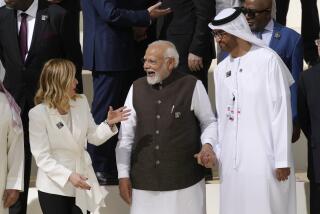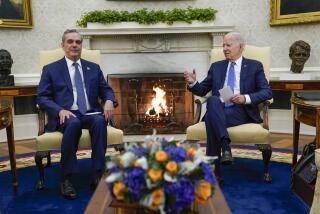APEC vows swift economic action
LIMA, PERU — President Bush and other world leaders vowed Sunday to act “quickly and decisively” to battle the global economic crisis as a 21-nation summit predicted worldwide recovery in 18 months.
But the final declaration from the Asia-Pacific Economic Cooperation forum was short on specifics, beyond a vow by participating nations to avoid pressures to implement “protectionist” measures, such as import restrictions.
“We are convinced that we can overcome this crisis in a period of 18 months,” the leaders said in a forecast added to a statement originally issued Saturday.
The 18-month timeline reportedly was inserted at the insistence of Peruvian President Alan Garcia, who hosted the three-day session of Pacific Rim countries that account for about half of the world’s economic output. “We are going to defeat this crisis,” he vowed.
Asked about the 18-month prediction, Daniel Price, a White House economic advisor who was at the summit, told reporters that Bush “believes that the actions we are taking now will begin to produce results in the much nearer term, in the coming months,” adding: “The president shares the confidence that we will be able to get through this crisis.”
But several participants, including Mexican President Felipe Calderon and Canadian Prime Minister Stephen Harper, described the 18-month timeline as more of a goal than a prediction.
The summit -- marking Bush’s final scheduled foreign trip as president -- might have been more symbol than substance, analysts agreed. But the forum gave the White House added support it had sought for its broad guidelines to avert a worsening global economic crisis.
The APEC group strongly backed the so-called Washington Declaration, a blueprint for economic stimulus and improved regulation hammered out by the Group of 20 nations last week in the U.S. capital.
“The current global financial crisis is one of the most serious economic challenges we have ever faced,” the APEC group said in its concluding statement. “We . . . will take all necessary economic and financial measures to resolve this crisis, taking the necessary actions to offer hope to those most in need.”
Participating nations, including China, Japan and the United States, have already enacted massive rescue packages in a bid to limit the fallout from the economic bust.
Earlier, Bush had urged the Pacific Rim nations to endorse the Washington guidelines, including a commitment to modernize the traditional watchdog role of governments.
“There’s a recognition that while our economies have changed, the financial structures that we are dealing with were primarily written in the 20th century,” Bush told gathered executives here. “We believe in transparency and integrity in the markets that will make sure that firms and financial products are subject to proper regulation and oversight.”
The president’s imminent departure from office had a clear impact on the summit’s proceedings.
Calderon warned President-elect Barack Obama, who was not represented here, against trying to rewrite the North American Free Trade Agreement. Obama has expressed reservations about the almost-15-year-old trade pact between the United States, Mexico and Canada.
Restricting commerce, warned Calderon, a staunch U.S. ally, could spur additional illegal immigration to the United States by shutting down jobs in Mexico.
Participating nations were keen to know what would be next from Washington.
“The very understandable concern of these foreign governments is, ‘Will the new administration do some sort of policy review?’ ” Dennis Wilder, the White House’s top East Asia advisor, told reporters. “ ‘Will it try to work with some new ideas?’ ”
At times the sessions took on the feeling of a farewell tour. Although Bush is deeply unpopular in Latin America, protests were relatively few, and demonstrators were kept far away from the heavily guarded Defense Ministry compound and coastal Marriott Hotel, the two sites where the president spent most of his time.
Bush lightly alluded to his “forced retirement,” after Harper wished him and Laura Bush the best “if I don’t see you again before the 20th of January.”
During a visit with Russian President Dmitry Medvedev, Bush noted that it would be his last meeting as sitting president with the leader of Russia, and reflected on his legacy.
“We’ve had our agreements, we’ve had our disagreements,” Bush said. “I’ve tried to work hard to make it a cordial relationship, though.”
Medvedev thanked the president and called their joint efforts “successful,” though there was no indication of an easing in tensions on such issues as the war in Georgia and U.S. plans to install missiles in Eastern Europe.
--
More to Read
Sign up for Essential California
The most important California stories and recommendations in your inbox every morning.
You may occasionally receive promotional content from the Los Angeles Times.










